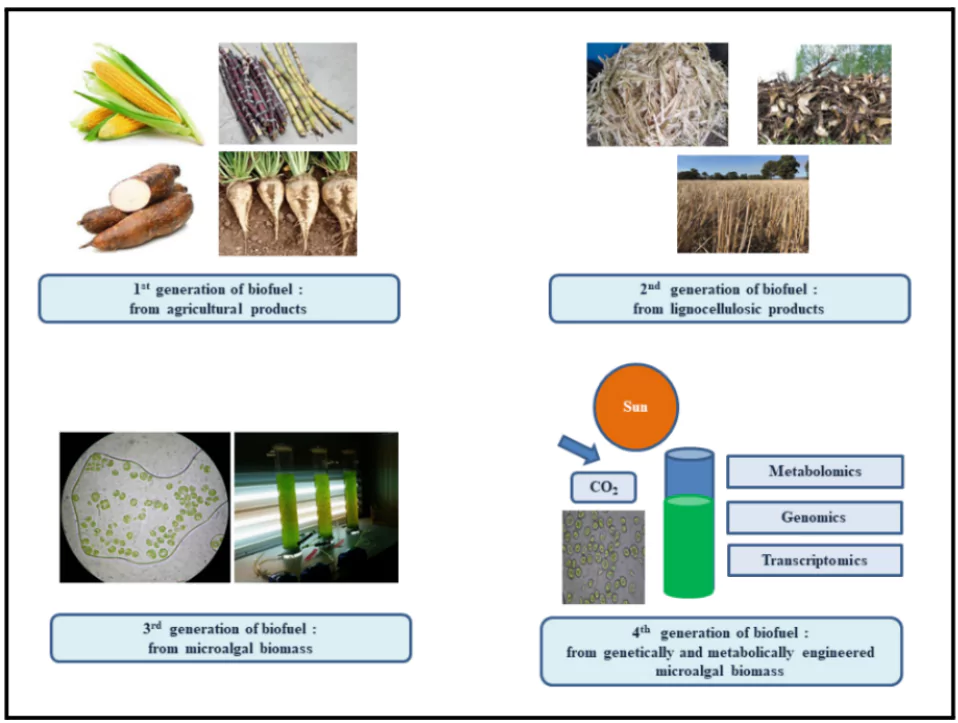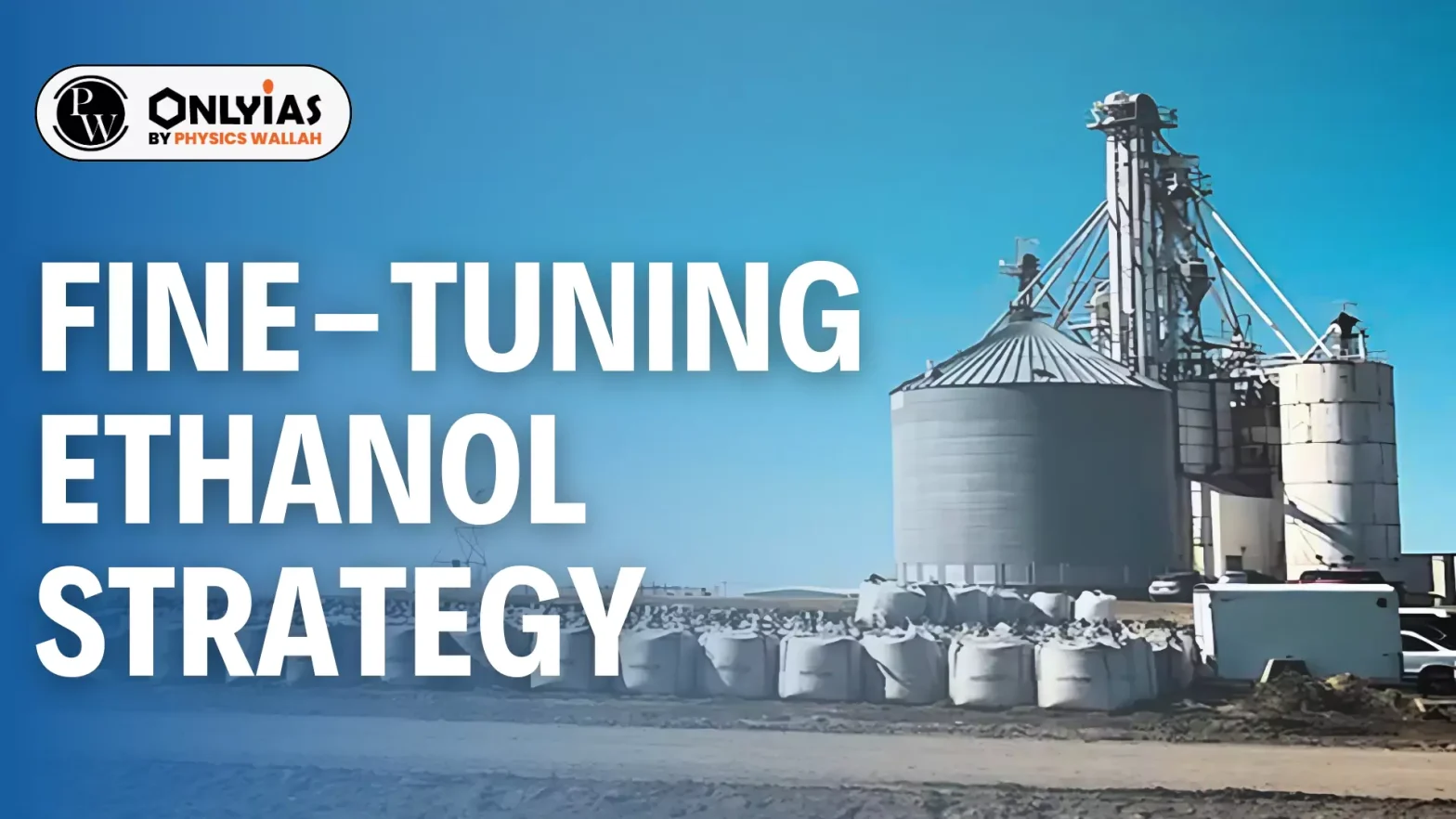Over the past few months, as domestic corn prices have exceeded global rates, India’s poultry sector has struggled with rising feed costs according to industry associations, market research agencies, and key market players.
Transition to a Sustainable Energy Future
- India is trying to move towards a sustainable future i.e. use of clean energy and less use of fossil fuels like petroleum, natural gas, coal, etc. This would create less pollution.
- Ethanol: In this context, ethanol, one of the principal biofuels, is strategically important to India as the government aims to achieve 20 percent Ethanol blending (E20) by 2025.
Enroll now for UPSC Online Course
Ethanol Blending
Ethanol blending is blended motor fuel containing ethyl alcohol that is at least 99% pure and is derived from agricultural products, and blended exclusively with petrol. |
Ethanol Blending in India
- The ethanol blending percentage in India has surged from 1.53 percent in 2014 to 15 percent in 2024.
- Benefits: This significant progress has yielded substantial benefits, including Rs 99.014 crore in foreign exchange savings as India imported as crude oil, a reduction of 519 lakh metric tonnes in CO2 emissions, and the substitution of 173 lakh metric tonnes of crude oil.
- Bio E3 Policy: The recently approved Bio E3 policy underscores the importance of capturing and storing carbon and utilising biomass for achieving net zero targets.
Four Generations of Biofuel
- First Generations Ethanol: Agricultural products like sugarcane molasses, corn, and sweet potatoes are used to make ethanol. However, this presents a problem, as diverting these crops to fuel production could lead to food scarcity and rise in prices of these products in the country.
-
- This is because sugarcane is used to produce sugar, and corn is used as fodder and for human consumption. In a country like India which is still facing food insecurity, diverting these crops to make fuel could result in an increase in prices.
- Second Generations Ethanol: Lignocellulosic products are used like byproducts from agricultural production. Hence the Indian government is trying to shift to second generation ethanol from first
- Third Generations Ethanol: Fuel is produced by algae from wastewater, sewage or salt water.
- Fourth Generations Ethanol: Fourth-generation biofuels use genetically engineered microorganisms.

Corn Conundrum
- Need for Diversification: India has mainly relied on sugarcane and corn to produce ethanol which has helped in reducing imports of crude oil. However, this has resulted in an increase of prices of sugarcane and corn and their related products.
- Corn Trade Deficit: A country that used to be a corn exporter is now importing corn. India currently has a $57 million trade deficit in corn compared to a $405 million trade surplus in the last year.
- Corn Imports from Myanmar and Ukraine: Myanmar has become a significant corn exporter to India, totaling $64.73 million in the current year, up from $0.19 million in 2023-24. Corn imports from Ukraine have touched $36.05 million in the current year compared to $30.22 million last year.
- Reasons for Corn Import: Corn is used as fodder for livestocks which is very important in the agriculture sector.
Check Out UPSC Modules From PW Store
- Impact: This has impacted India’s food security and poultry sector.
- Poultry Sector: The poultry sector has struggled with rising feed costs, as corn is the main ingredient comprising up to 65 percent of input costs.
- Cost: Import cost is higher due to taxes which would make sustaining the poultry sector difficult. This would increase the prices of eggs and other produce.
- Demands from Poultry Sector: Rising in feeding cost has led to calls for duty-free corn imports and approval of genetically modified corn as India does not allow imports of GM crops.
- National Policy on Biofuels, 2018: When the price of sugar was increased the government denied using Sugarcane for making ethanol.
- The National Policy on Biofuels, 2018, with its amendment in 2022, currently includes an expansive list of items as raw material for ethanol production, including heavy molasses, biomass, sugar-containing materials such as sugar beets, and starch-containing materials such as corn.
Challenges – Balancing Ethanol and Food Security
- Rice Dilemma: In 2022, about 1 million tonnes of Food Corporation of India (FCI) rice was sold to distillers at subsidised rates for ethanol production leading to a halt in the supply of broken and surplus rice for grain-based ethanol makers in July 2023 to contain rising domestic prices.
- Arable Land Constraints: India lost about 5 million hectares of arable land used to grow food crops between 1978-79 and 2018-19, while fallow land increased by 4.3 million hectares.
Steps Taken and Solutions
- Strategic Land Planning: Reviving fallow lands (not used for growing plants) for fuel crops can enhance ethanol output without reducing the area under food crops. This approach can help balance the needs of ethanol production with other industries and maintain food security.
- Focus on Second Generation: There is a need to focus towards second-generation (2G) bioethanol, which uses agricultural waste as a sustainable feedstock.
- India needs to utilise 500 million tonnes of agricultural waste annually produced in the country.
- Dedicated Refineries: Two second-generation refineries have been established in Panipat and Numaligarh to convert agricultural residues such as stubble and bamboo into ethanol.
- Although the process is complex and there is high capital investment in the initial stages. But if India is able to use agriculture waste for ethanol then the problem of food insecurity and high imports can be controlled.
- Financial Support: The government has introduced the Pradhan Mantri JI-VAN scheme to support advanced biofuel projects financially, aiming to promote the development of 2G bioethanol.
Enroll now for UPSC Online Classes
Conclusion
There is a need to strike a balance between the needs of ethanol production with other industries and maintain food security. This would help in ensuring a more predictable and sustainable supply of raw materials and would help India achieve net zero i..e cutting carbon emissions.
![]() 12 Oct 2024
12 Oct 2024


